Call Us - 0458 190 172
Acne
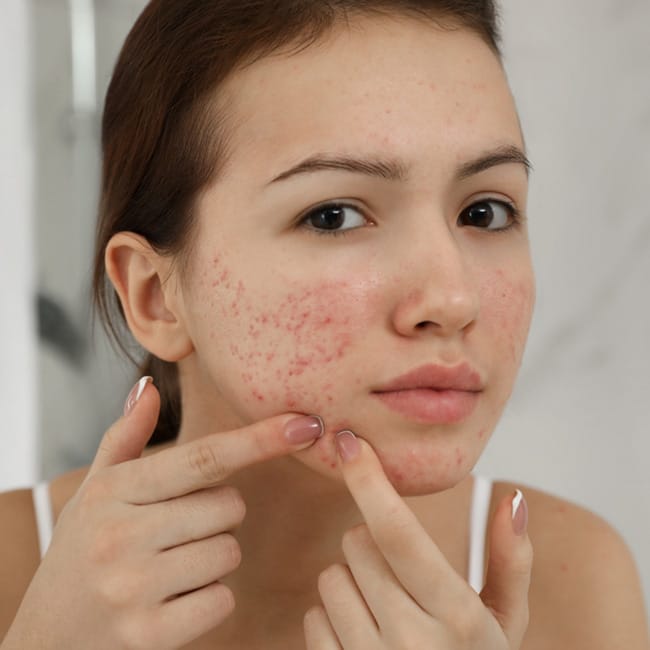
Common Skin Concern
Acne
Acne is a common skin condition that occurs when hair follicles become clogged with oil, dead skin cells, and bacteria. It primarily affects the areas of the skin with a high density of oil glands, such as the face, chest, back, and shoulders. Acne can range from mild to severe and can have both physical and emotional impacts affecting one’s confidence, and even leave scars if not treated properly.
If you suffer of acne, we have a range of treatments and packages made specifically to combat acne so you can restore your confidence and help you towards achieving glowing skin that you deserve!
Schedule Your Acne Treatment Today!

Common Skin Concern
Acne
Acne is a common skin condition that occurs when hair follicles become clogged with oil, dead skin cells, and bacteria. It primarily affects the areas of the skin with a high density of oil glands, such as the face, chest, back, and shoulders. Acne can range from mild to severe and can have both physical and emotional impacts affecting one’s confidence, and even leave scars if not treated properly.
If you suffer of acne, we have a range of treatments and packages made specifically to combat acne so you can restore your confidence and help you towards achieving glowing skin that you deserve!
Schedule Your Acne Treatment Today!
What Causes Acne?
Acne is primarily caused by the interplay of several factors that contribute to the blockage of hair follicles and the development of inflammation, this includes excess sebum production, abnormal skin cell shedding, poor diet, bacterial overgrowth, hormonal factors such as stress, pregnancy or menstrual cycles, genetic predisposition, environmental factors like having high exposure to humidity or sweating and certain medications may also trigger acne response.
It’s important to note that the causes and severity of acne can vary from person to person. Identifying the specific factors contributing to an individual’s acne is essential for effective treatment.
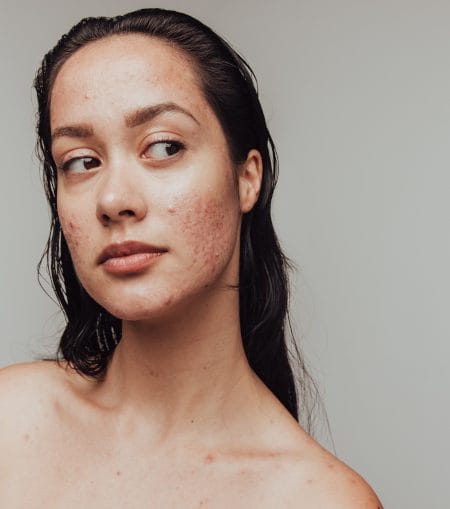

What Causes Acne?
Acne is primarily caused by the interplay of several factors that contribute to the blockage of hair follicles and the development of inflammation, this includes excess sebum production, abnormal skin cell shedding, poor diet, bacterial overgrowth, hormonal factors such as stress, pregnancy or menstrual cycles, genetic predisposition, environmental factors like having high exposure to humidity or sweating and certain medications may also trigger acne response.
It’s important to note that the causes and severity of acne can vary from person to person. Identifying the specific factors contributing to an individual’s acne is essential for effective treatment.
The Signs of Acne
The Signs of Acne
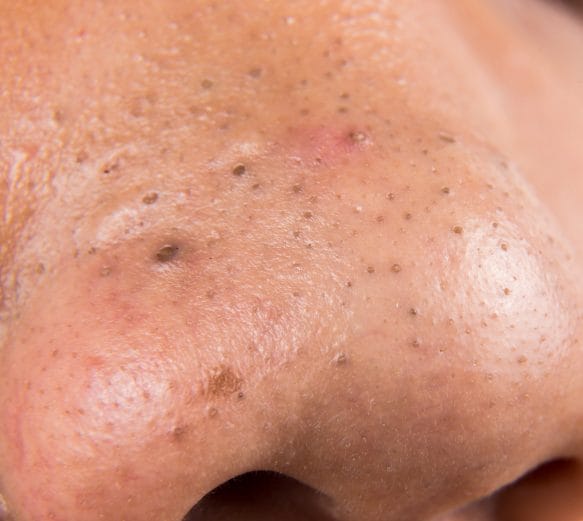
Blackheads
Acne blackheads, also known as open comedones, are small, dark spots on the skin formed by clogged hair follicles. They occur when excess oil and dead skin cells accumulate in the pores and oxidize upon exposure to air, giving them their characteristic black appearance.
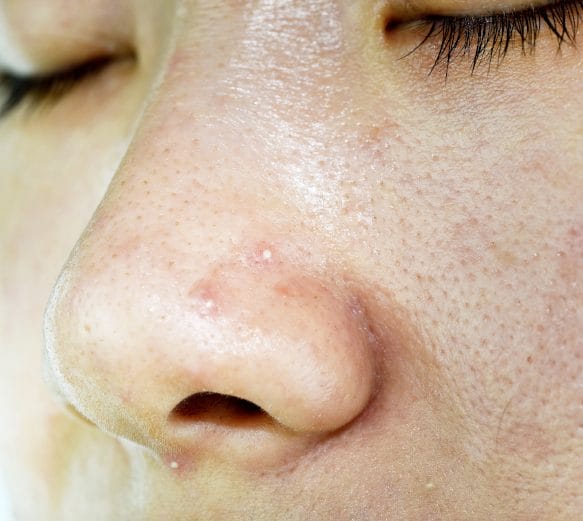
Whiteheads
Acne whiteheads, or closed comedones, are small, white or flesh-coloured bumps on the skin. They form when oil and dead skin cells accumulate within the pores, leading to a closed-off, raised appearance. They have a closed surface, preventing oxidation of the trapped debris, maintaining their white or flesh tone.
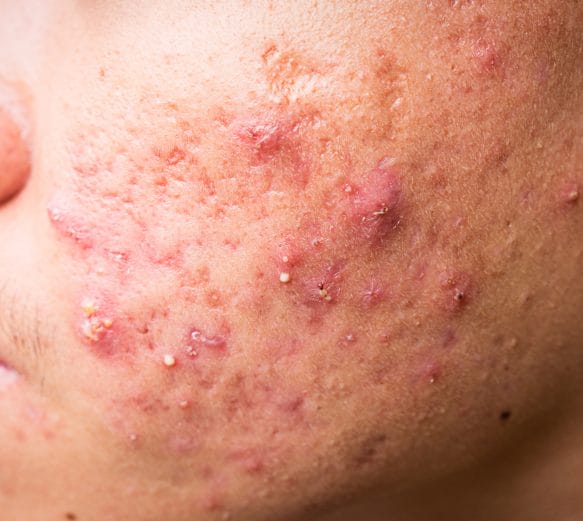
Pulstules & Cysts
Cysts are larger, pus-filled lumps beneath the skin surface, characterized by their deep, painful nature. These nodules result from a more severe form of acne, often forming when pustules or other lesions rupture deep within the skin, causing inflammation and infection to spread.

Blackheads
Acne blackheads, also known as open comedones, are small, dark spots on the skin formed by clogged hair follicles. They occur when excess oil and dead skin cells accumulate in the pores and oxidize upon exposure to air, giving them their characteristic black appearance.

Whiteheads
Acne whiteheads, or closed comedones, are small, white or flesh-coloured bumps on the skin. They form when oil and dead skin cells accumulate within the pores, leading to a closed-off, raised appearance. They have a closed surface, preventing oxidation of the trapped debris, maintaining their white or flesh tone.

Pulstules & Cysts
Cysts are larger, pus-filled lumps beneath the skin surface, characterized by their deep, painful nature. These nodules result from a more severe form of acne, often forming when pustules or other lesions rupture deep within the skin, causing inflammation and infection to spread.

Clearance of Pores & Sebrum Reduction
Our laser treatment will help unclog pores by targeting and shrinking the sebaceous glands and reducing the size of enlarged pores which prevents debris and bacteria buildup, which can cause acne.

LED Light Therapy
Using light-emitting diode technology, this stimulates collagen production and increases the rate of skin cell renewal, this is very effecttive at targeting and killing acne causing bactertia.
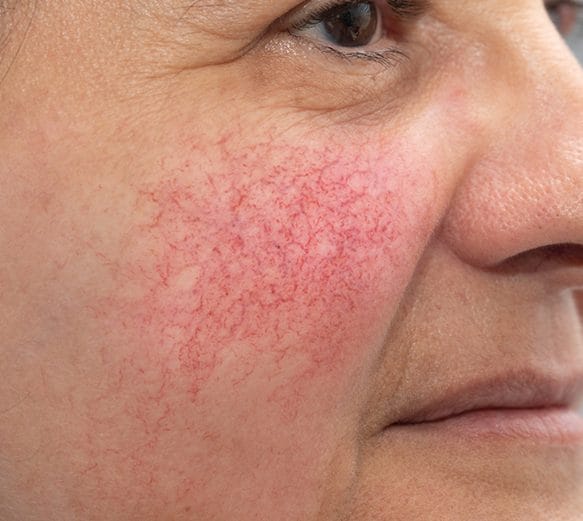
Laser Redness/Rosacea Reduction
Our laser redness and rosacea treatment targets the blood vessels that supply acne inflamed areas, effectively reducing the redness and inflammation associated with acne.
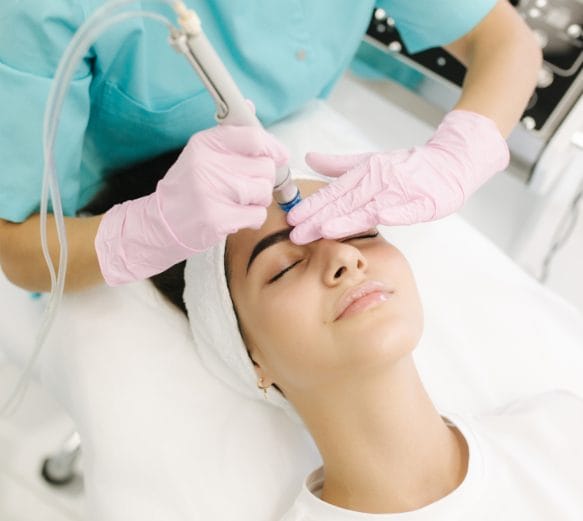
Microdermabrasion
A non-invasive skin resurfacing procedure which gently exfoliates and removes dead skin cells, unclogging pores and stimulating cell renewal, this is great complementary treatment for acne
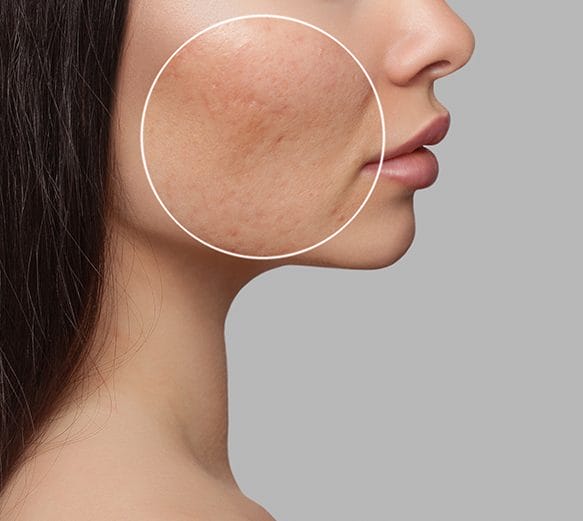
Acne Scar Removal
Our advanced Pico laser treatment targets scars by breaking down scar tissue, stimulate collagen production, and promote skin regeneration. Over time, this process helps smooth out the skin’s texture and improve overall tone.
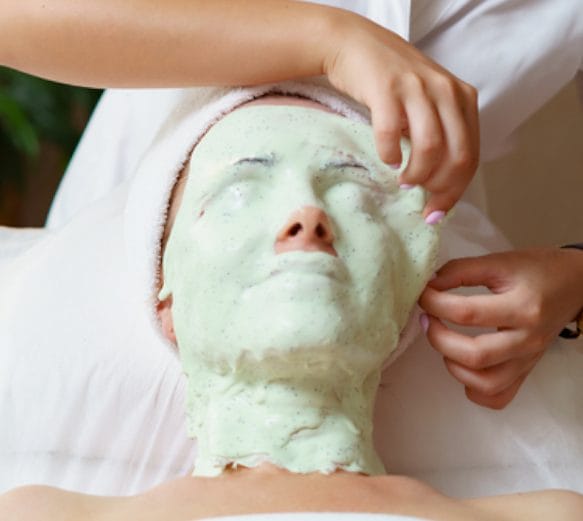
Our Signature Facials
Our cosmetic-grade facials are an excellent preparation for acne treatments, as they deeply cleanse the pores, remove dead skin cells, and nourish the skin—helping to reduce breakouts and create a clear, balanced complexion.

Pore & Sebrum Reduction
Our laser treatment will help unclog pores by targeting and shrinking the sebaceous glands and reducing the size of enlarged pores which prevents debris and bacteria buildup, which can cause acne.

LED Light Therapy
Using light-emitting diode technology, this stimulates collagen production and increases the rate of skin cell renewal, this is very effecttive at targeting and killing acne causing bactertia.

Laser Redness/Rosacea Reduction
Our laser redness and rosacea treatment targets the blood vessels that supply acne inflamed areas, effectively reducing the redness and inflammation associated with acne.

Microdermabrasion
A non-invasive skin resurfacing procedure which gently exfoliates and removes dead skin cells, unclogging pores and stimulating cell renewal, this is great complementary treatment for acne

Acne Scar Removal
Our advanced Pico laser treatment targets scars by breaking down scar tissue, stimulate collagen production, and promote skin regeneration. Over time, this process helps smooth out the skin’s texture and improve overall tone. Multiple sessions may be required for optimal results, depending on the severity of the scars.

Our Signature Facials
Our cosmetic-grade facials are an excellent preparation for acne treatments, as they deeply cleanse the pores, remove dead skin cells, and nourish the skin—helping to reduce breakouts and create a clear, balanced complexion.
Frequently Asked Questions
Who is most at risk for acne?
Acne can affect people of all ages, but it is most common during adolescence due to hormonal changes. However, adults can also experience acne, particularly women due to hormonal fluctuations.
How can I prevent acne?
You can help prevent acne by practicing good skincare habits, such as keeping your face clean, avoiding touching your face, using non-comedogenic skincare products, and managing stress levels.
What are the treatment options for acne?
. Over-the-counter treatments like benzoyl peroxide and salicylic acid are commonly used for mild acne. For moderate to severe acne, prescription medications such as topical retinoids, oral antibiotics, or isotretinoin may be recommended. Procedures like cometic grade facials and laser therapy are also a very effective option.
Can diet affect acne?
While the relationship between diet and acne is still being studied, some evidence suggests that certain foods, such as dairy and high-glycaemic-index foods, may contribute to acne in some individuals. Eating a balanced diet rich in fruits, vegetables, whole grains, and lean proteins may help maintain healthy skin.
Can acne leave scars?
Yes, severe or untreated acne can sometimes lead to scarring. It’s essential to seek treatment for acne early to help prevent scarring.
Frequently Asked Questions
Who is most at risk for acne?
Acne can affect people of all ages, but it is most common during adolescence due to hormonal changes. However, adults can also experience acne, particularly women due to hormonal fluctuations.
How can I prevent acne?
You can help prevent acne by practising good skin care habits, such as keeping your face clean, avoiding touching your face, using non-comedogenic skincare products, and managing stress levels.
What are the treatment options for acne?
Over-the-counter treatments like benzoyl peroxide and salicylic acid are commonly used for mild acne. For moderate to severe acne, prescription medications such as topical retinoids, oral antibiotics, or isotretinoin may be recommended. Procedures like cosmetic grade facials and laser therapy are also very effective options.
Can diet affect acne?
While the relationship between diet and acne is still being studied, some evidence suggests that certain foods, such as dairy and high-glycaemic-index foods, may contribute to acne in some individuals. Eating a balanced diet rich in fruits, vegetables, whole grains, and lean proteins may help maintain healthy skin.
Can acne leave scars?
Yes, severe or untreated acne can sometimes lead to scarring. It’s essential to seek treatment for acne early to help prevent scarring.
